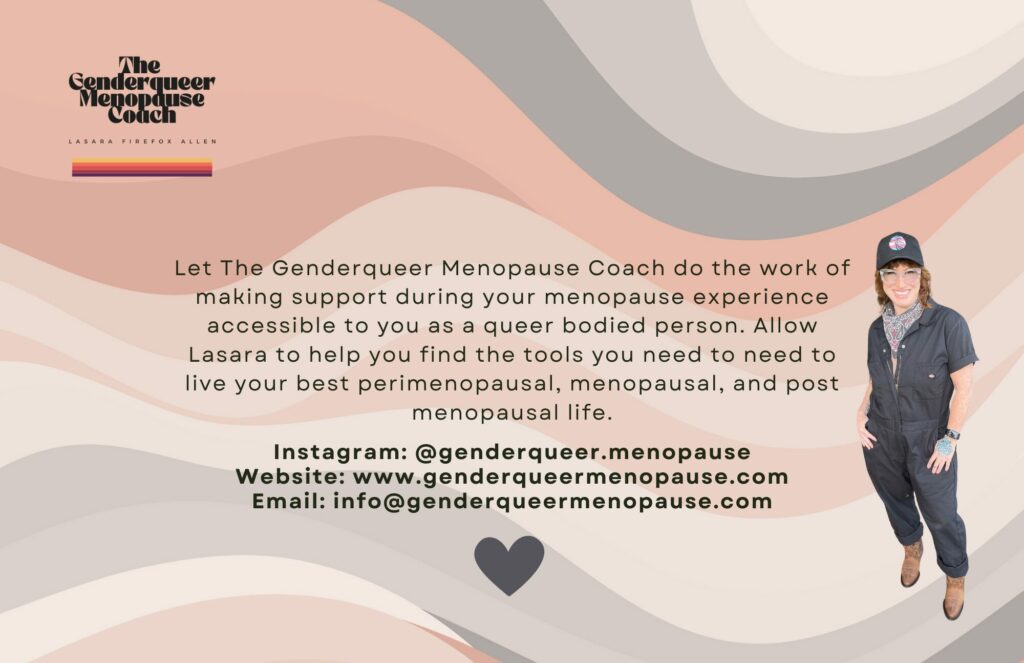Providing gender-affirming menopause care for healthcare providers is an opportunity for ongoing education and learning. In order for healthcare providers to offer affirming care, it’s essential to recognize and address the unique needs of genderqueer individuals experiencing the menopause transition. By understanding the intersection of gender identity and menopausal health, medical professionals can provide inclusive and affirming care. This article aims to equip healthcare providers with some basic knowledge and tools necessary to support genderqueer folx during this significant life transition.
Understanding Gender Diversity

Healthcare providers must have a comprehensive understanding of gender diversity beyond the binary understanding of male and female. Genderqueer individuals may identify as non-binary, gender-nonconfomring, genderfluid, agender, or otherwise, and their experiences of menopause may differ from cisgender women. Avoid making assumptions about a patient’s gender identity and inquire respectfully about their pronouns and preferred name.
Respect for Chosen Names and Pronouns
Respecting a patient’s pronouns and chosen name is essential for affirming their gender identity. During menopausal consultations, healthcare providers should use inclusive language and ask patients about their preferred terms for body parts and medical procedures. Creating a welcoming and respectful environment fosters trust and enhances patient-provider communication.
Knowledge of Hormone Therapy and Surgical Transition

Genderqueer individuals undergoing hormone therapy or surgical transition may have unique healthcare needs during menopause. Menopause hormone therapy (MHT), also known as hormone replacement therapy (HRT), regimens may need to be adjusted to manage menopausal symptoms effectively while maintaining hormonal balance. Healthcare providers should be knowledgeable about the interactions between menopausal treatments and gender-affirming therapies.
Addressing Menopausal Symptoms and Hormonal Changes
Menopause can present a range of physical and psychological symptoms, including hot flashes, mood swings, and vaginal/front hole/bonus hole dryness and atrophy. Genderqueer individuals may experience dysphoria related to changes in their bodies and hormone levels. Healthcare providers should offer personalized treatment options, including hormone therapy, lifestyle modifications, and mental health support, tailored to each patient’s unique needs.
Fertility Preservation and Reproductive Health
Genderqueer individuals may have diverse reproductive goals and concerns during menopause, whether chemically induced, surgically induced, or due to ovarian/reproductive age. Some may wish to preserve fertility through assisted reproductive technologies, such as egg freezing before undergoing hormone therapy or surgical transition. Healthcare providers should discuss fertility preservation options with patients and provide referrals to reproductive specialists as needed.
Cultivating Cultural Competency and Sensitivity
Cultivating cultural competency and sensitivity is essential to providing inclusive care for genderqueer individuals during menopause. Healthcare providers should undergo training on LGBTQIA+ health disparities, transgender and non-binary identities, and gender-affirming care practices. Creating a safe and affirming healthcare environment requires ongoing education and awareness of diverse patient experiences.
Collaborating with Interdisciplinary Teams

Collaborating with interdisciplinary teams, including mental health professionals, endocrinologists, and LGBTQIA+ community organizations, enhances the quality of care for genderqueer individuals during menopause. Healthcare providers should facilitate open communication and coordination of care to address the holistic needs of patients.
Providing gender-affirming care during menopause requires healthcare providers to recognize and respect the diverse identities and experiences of genderqueer individuals. By prioritizing inclusivity, cultural competency, and collaboration, medical professionals can support genderqueer folx through this significant life transition with empathy, dignity, and respect. Together, we can create healthcare environments that affirm and empower all individuals, and honor gender diversity.


